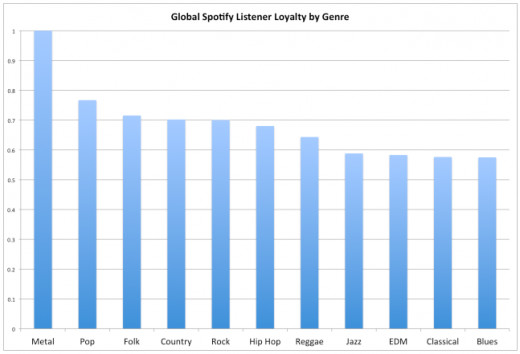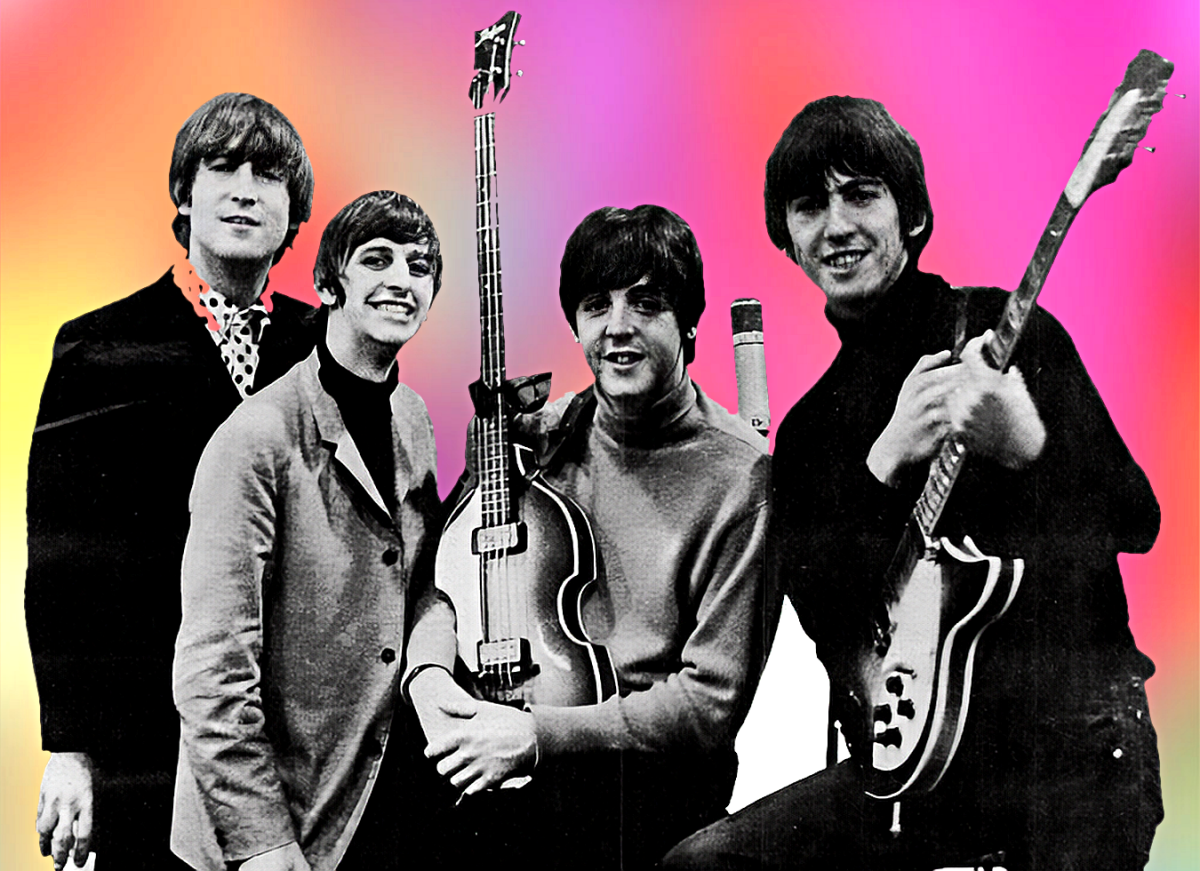Heavy Metal: A Musical Genre That's Making a Comeback

The Kids are Alright
A recent article in the Pacific Standard got me thinking about my youth growing up in the 80's and listening to my favorite Metal bands. This study confirmed that those of us who grew up in the 80's and listened to Heavy Metal music have matured into well-adjusted and responsible adults who are better adjusted than our peers who listened to other musical genres. (You can find the entire article here: #mce_temp_url#)
My reaction was "Well Duh!". Many of us were latchkey kids having to basically fend for ourselves while both parents worked outside the home. This entailed being street smart and having adult-like responsibilities while at home alone. Being able to problem-solve and adjust to changes, quickly molded us into a great workforce. While most kids growing up in the 80's were in this situation, what made those of us more unique than our non-metal listening counterparts was our musical savvy, ability to debate our likes and dislikes within the metal genre and even becoming inspired to take up an instrument or start a band.
Studies have shown that children who are active in art, music or sports tend to do overall better in school than children who are not engaged in any extracurricular activities. So it really comes as no surprise to me that this recent study proves we all became responsible adults.

Metal Fans are not Satan Worshippers
Another interesting footnote that came out of that study was that despite the constant criticism from some adults at the time of heavy metal being "the devils music" or "Satan worship music", we still grew up to be well-adjusted adults. In the 80's there were all sorts of claims, mostly by certain religious groups, that heavy metal music caused people to commit suicide, have ritualistic sacrifices and ceremonies or commit violent crimes, all in the name of Satan! This could not have been further from the truth.
And honestly, any well-adjusted kid, regardless of any kind of "satanic" imagery being promoted on an album cover or in a song knew better; that they were all just advertising gimmicks to sell more records. There were some parents that were so adamant that their child's tragedy was linked to heavy metal music, some bands were brought to trial on criminal charges.
Iron Maiden: The Number of the Beast
In 1982, Iron Maiden released their album titled, The Number of the Beast, leading Christian groups to call for a massive boycott of the album. They formed album burning parties. Then they of course learned how toxic it was to burn vinyl, so instead changed it to record-smashing parties where they would beat on the albums with a hammer into tiny pieces. Had they actually listened to the album (and other Iron Maiden albums) they would hear well-written lyrics that transport you to different places and times, lyrics that were fantasy-inspired and bring the listener on a journey.
The bands bass player, Steve Harris, who is also one of their primary song writers, thought the whole banning and burning was completely over the top. He said he got the idea for the album name after having a nightmare from watching the movie, Damien, The Omen II. Go Figure.

Judas Priest: The Subliminal Message Trial
In 1985, two teens, Raymond Belknap and James Vance commit self-inflicted gunshot wounds by taking a 12 gauge shotgun under their chins and pulling the trigger. Belknap died instantly. Vance survived, barely, having sustained extensive facial damage and later died in 1988 from complications of those facial wounds.
In 1990, the band Judas Priest is brought to trail by Belknap and Vance's parents, claiming that there was a subliminal message on the song, Better by you, Better than me, off the album, Stained Class (1978) that caused the men to commit suicide. The suit alleged that there was a subliminal message in the song that said "do it", which caused the young men to decide to create a suicide pact and kill themselves (after hours of smoking pot and drinking).
The charges eventually got dismissed. The conclusion was that background vocals on the song were mixed in such a way that could cause a phenomenon that sounds like someone whispering something, but was purely coincidental and not intentional.
I distinctly remember this whole fiasco in the news. I thought about it then as I do now; the suit is so ridiculous. It was obvious the parents and lawyers were looking for a way to make a buck. I dunno, maybe if the parents did their job correctly those men would still be alive. There obviously had to be something else going on in those kid's lives. No one just wakes up one day and thinks about committing suicide.
Ozzy Osbourne: Suicide Solution
Another teen suicide blamed on heavy metal music happened in 1984. Teen John McCollum (who was clinically depressed) commits suicide listening to Ozzy's song, Suicide Solution, off the album, Bilzzard of Oz (1980). His parents bring criminal charges against Ozzy, claiming the song talked their son into killing himself. If the parents had listened to the song, they might have found out that the song isn't glorifying the act of suicide, but can be interpreted in talking someone out of suicide. Suicide is the cowards way out in dealing with your demons. Being an alcoholic is a slow way of killing yourself. Ozzy definitely had his share of demons while writing this song. He was an alcoholic for many years and this song was a way to deal with those demons. No where in the lyrics does it encourage anyone to commit suicide. The courts agreed and ruled in Ozzy's favor.
Metal Then and Now
Sometime after the early 1990's, there was a shift in mainstream music and metal fell out of favor. The bands we grew up with were not getting airplay anymore and MTV, who was one of the biggest supporters of the genre stopped playing videos. Not just metal videos, but videos period (You can thank 'reality TV'). There was no mainstream carrier of metal music anymore, forcing devoted fans to actively seek out their favorite bands and/or start listening to some other music. Grunge became huge and I admittedly like that genre as well. Grunge to me was the stripped-down version of metal. Some of it was heavy, some not so much, but all were virtually influenced by some metal and classic rock bands who came before them.
Then in the late 90's and early 2000's, came Nu-Metal. It was kind of like a hybrid of metal, rap and rock. This hybrid genre had some good bands, but it never really satisfied my classic heavy metal longings. Its like when you are craving a filet mignon and you get cube steak instead. Some would argue with me on that point, but I really missed the songs and sounds of my youth and I know I'm not alone in that fact. Something was definitely missing in the "nu-metal" sound. Maybe it was songwriting ability. Maybe it was craftsmanship. Maybe some of these bands just had no talent but record companies would sign them and push them anyway because it was the hot, new thing making boatloads of money for them.
Recapturing an Audience
Let's face it, the music getting airplay these days is manufactured pop music with no substance. Kids don't know what they are really missing out on unless they have incredibly cool parents that grew up in the 80's and have introduced their kids to some great music. I know, this sounds like a "back-in-my-day speech", but tell me how many people "collaborated" on any number of popular songs on the radio right now. My bet is that it is over 10 people for one song and none of them are in the band or are the artist themselves. There is no "craft" to this music. It's all about making money period. It's no wonder so many rock acts have crossed over into country; that's the only singer/songwriter, artistry-driven genre still getting airplay.
But there is hope. People like myself have been reached by the bands of our youth who are still turning out albums and touring, largely through social media. Social media has been a godsend to this genre as an effective way to market directly to the consumer. Apps like Twitter take it one step further, with certain bands or band members being able to directly interact with their fans.
Going one step further, new fans can and have been found. Millennials are extremely connected up on social media and are exposed to these bands. This is exposure they would not normally get in the mainstream media outlets.
The Resurgence is Here
Recent Spotify data suggests that the number one most popular genre on that service is Heavy Metal, with pop coming in a far second. They also suggested that metal fans are more loyal to their music than pop fans.

Heavy Metal is Back
It really never completely went away. Bands that take advantage of all facets of the internet and social media ARE reaching their target audience and judging by the few concerts I have been to in the last few years, they are selling out their shows. Those bands that have learned to adapt have done really well, regardless of airplay, mainstream labels and big wig management teams.
More to Come....
Thanks for stopping by to read my op ed piece on my favorite music genre. Don't forget to check back soon, as I will be writing more hubs that showcase my favorite and talented metal guitarists, bassists and vocalists.
© 2015 Lisa Roppolo








